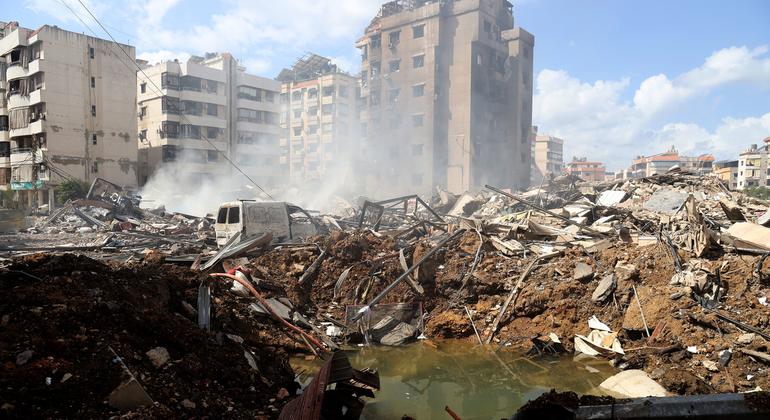Late last night, hundreds of people were reportedly displaced in Beirut and across Lebanon following Israeli displacement orders identifying a social finance network affiliated with Hezbollah, according to Farhan Haq, UN Deputy Spokesperson, briefing journalists in New York on Monday. The scale of displacement has overwhelmed available shelters, with nearly 1,100 collective shelters opened in Lebanon hosting some 192,000 displaced people. More than 900 of these shelters are already at full capacity. The highest percentage of those internally displaced has been recorded in Beirut and Mount Lebanon Governorate.
The airstrikes have not only displaced people but also damaged crucial humanitarian infrastructures. One of these airstrikes in the southern suburbs of the capital destroyed the UN sexual and reproductive health agency, UNFPA-supported safe space for women and girls, alongside a primary healthcare centre. This facility had provided counseling services, legal aid, and referrals for hundreds of women at risk and survivors of gender-based violence in one of Beirut’s most vulnerable communities. In Beirut, Bekaa, and Mount Lebanon, 10 facilities supported by UNFPA – including primary healthcare sites, safe spaces, and mobile maternity units – have closed due to insecurity.
Despite these challenges, UN humanitarian partners continue to provide aid across Lebanon. A six-truck aid convoy supported by UNICEF, the World Food Programme (WFP), and OCHA brought humanitarian supplies to Jaboule town in Baalbek Governorate. This was the first such delivery since September. The convoy brought enough food supplies to support 1,000 people for two months, along with five days’ worth of ready-to-eat meals. UNICEF provided water bottles, mattresses, blankets, and other items, including first aid and hygiene kits for the three shelters in Jaboule town.
During the briefing, Mr. Haq also noted that health authorities in Baalbek and Bekka governorates have issued an urgent call for support to strengthen health infrastructure in hard-to-reach areas. The conflict’s impact extends beyond Lebanon’s borders, with the UN International Organization for Migration (IOM) reporting that more than 800,000 people have been internally displaced in Lebanon. Additionally, more than 420,000 people have crossed into Syria, according to the UN refugee agency, UNHCR, with nearly 17,000 people arriving to seek shelter in Iraq.
The situation in Lebanon is dire, with thousands of people displaced and in need of urgent assistance. The destruction of vital infrastructure and the closure of essential facilities have further exacerbated the humanitarian crisis in the country. The international community must step up its efforts to provide support and aid to the displaced population in Lebanon and help rebuild the shattered communities.
The conflict in Lebanon has had far-reaching consequences, not only for the people directly affected but also for neighboring countries like Syria and Iraq, which are now also dealing with an influx of refugees. The need for immediate humanitarian assistance and long-term support for those affected by the conflict is crucial to prevent further suffering and instability in the region.
The UN and its partners are working tirelessly to provide aid and support to those in need, but more resources and funding are urgently required to address the growing humanitarian crisis in Lebanon. The international community must come together to provide the necessary assistance and support to help the displaced population rebuild their lives and communities in the wake of this devastating conflict.
As the situation in Lebanon continues to deteriorate, it is essential that the global community remains engaged and committed to providing the necessary support and resources to address the urgent needs of the displaced population. The time to act is now, to prevent further suffering and instability in the region and to help the people of Lebanon rebuild their lives and communities in the aftermath of this devastating conflict.









